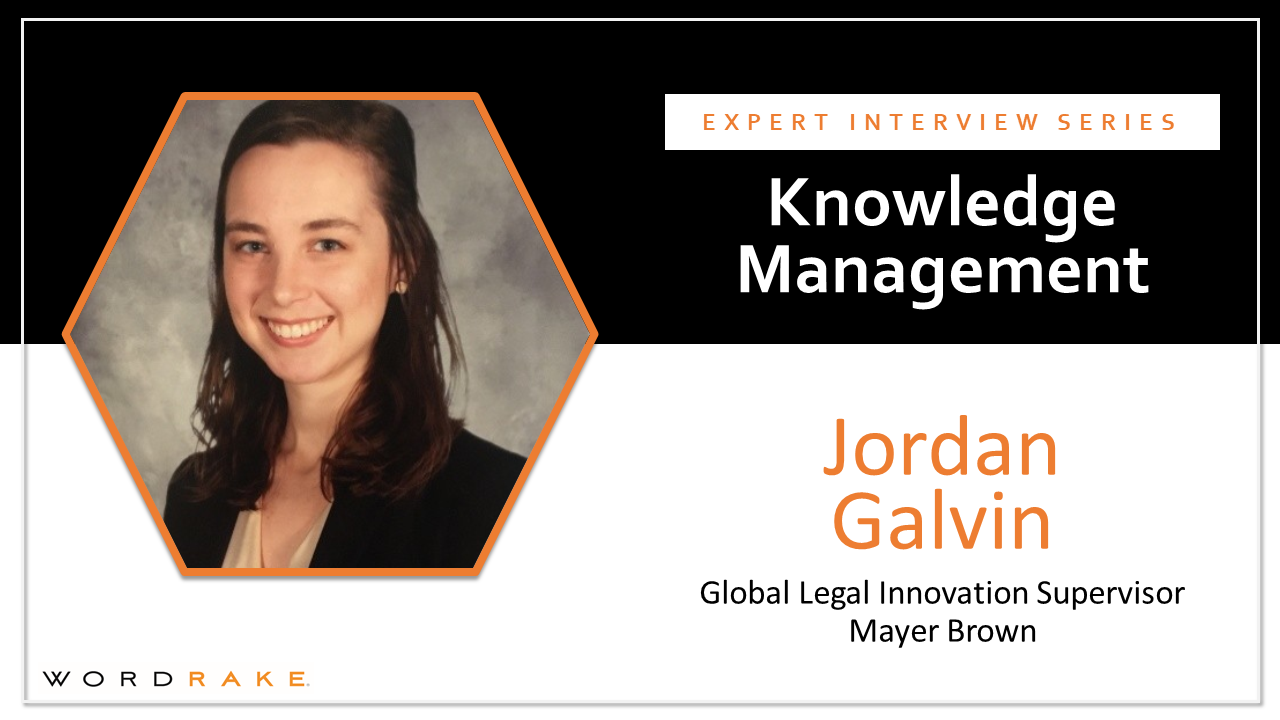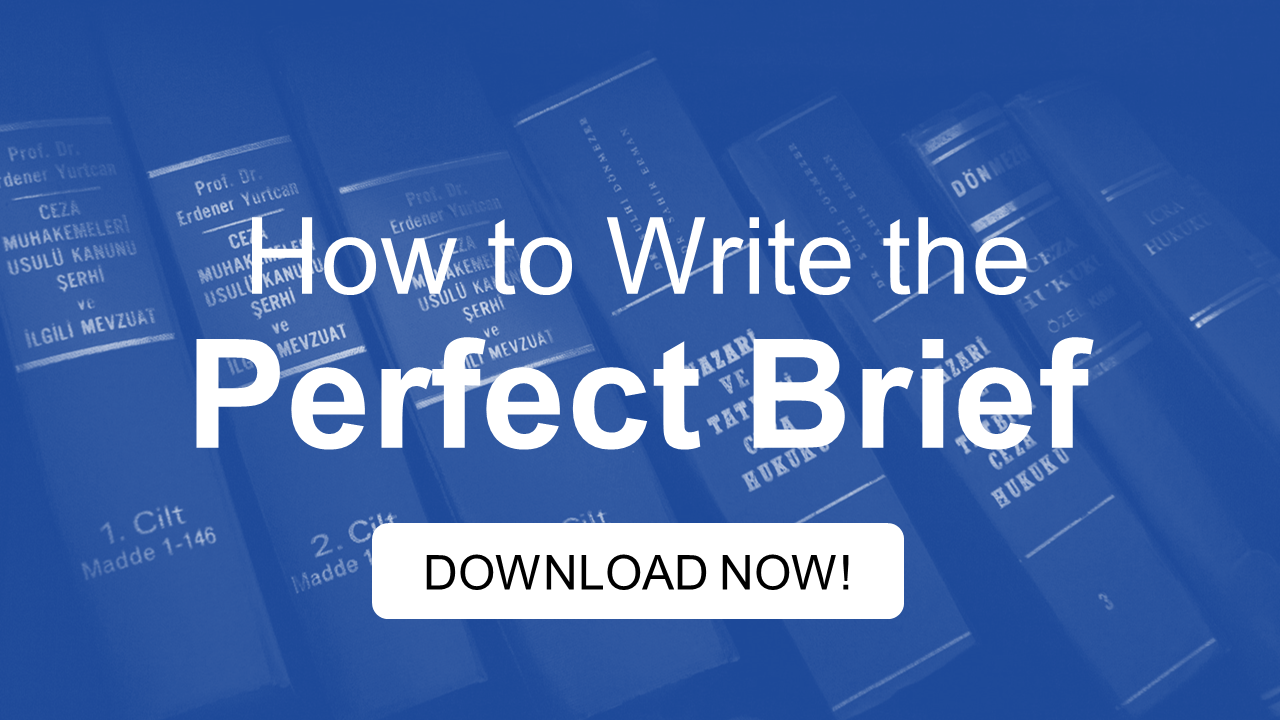Your firm knows they must implement a knowledge management system to be competitive, and they have a plan for how it’s going to happen—but why are there still so few materials in the database and why does it still seem so hard to use? When a firm’s knowledge management system is not allowed to reach its full potential, the company loses value through wasted time searching for or recreating what already exists. An important part of lawyers’ work is applying knowledge to the documents they create and retrieving knowledge stored within those documents; effective knowledge management and efficient, high-quality document creation go hand-in-hand. In this interview, knowledge management and innovation expert Jordan Galvin helps us understand the barriers law firms face when building knowledge management systems and how a firm’s knowledge management execution can set its innovation initiatives up for success.
What is your current role and how is it related to knowledge management and innovation?
I currently serve as the Global Legal Innovation Supervisor at Mayer Brown. In this role, I oversee the Legal Innovation & Strategy department’s Innovation Analysts; work with our lawyers and clients to translate their business needs into project requirements; manage the selection, initial contract negotiation, and onboarding of our vendors; manage projects; and advise Firm leadership, among other things. I also serve on the Firm’s Global Data Privacy Team, wherein I help the Firm identify and manage privacy issues related to innovation work.
How are knowledge management and practice innovation connected? What is a key difference and why are the roles often combined?
This is largely a matter of how each firm chooses to define each role. In the traditional sense, KM is more focused on capturing, standardizing, sharing, and scaling institutional and professional knowledge—e.g., creating standard forms of commonly-used legal documents, standardizing opinion letters, and creating taxonomies and storage schemes such that knowledge can be easily found in the future.
Practice innovation, where the department is completely discrete from KM, is more experimental and geared toward helping practice groups find new and better ways of working—often with technology as a core component. That said, I don’t think the two are completely distinct, even in firms that separate the departments. Often a project that falls under the remit of practice innovations will require a strong foundation in KM. Further, a lot of firms have either explicitly combined the two or made practice innovations an outgrowth of an existing KM function. This is because KM has steadily evolved over the years to go from gathering and standardizing knowledge to leveraging and scaling it with more advanced technologies.
What are the biggest technical, procedural, and cultural barriers to capturing knowledge?
One main barrier is not specific to law or KM, but it’s a big one: capturing data or knowledge needs to be as much a part of someone’s usual workflow as possible. If we have to go out of our way to do something we don’t see immediate benefits from, we are much less likely to do it (or do it completely or accurately). Culturally, there may be some protectionism in work product. That is, some in law firm settings may see knowledge as theirs and not want to share with the firm at large. There are also the added concerns of privacy and confidentiality that are heightened in a legal setting.
How can knowledge management improve document creation?
In a low-tech way, having standardized language to pull from (e.g. a model document) can keep lawyers from reinventing the wheel each time they have a relatively standard deal, or give them a starting point even where things are more complicated. They can also be sure they haven’t missed any important terms and that the terms have been approved by practice group leaders where required. In a slightly more technical way, creating standard naming conventions, folder structures, or saved searches on a document management system can make finding and sharing model documents, checklists, previously-given opinions, etc. simpler and faster. This not only improves document creation, it does so at scale. Finally, in a very technical sense, having underlying documents that have gone through the KM process (e.g. standardized, templated, optimized for search) is a prerequisite for document automation and may help firms get the most out of AI-powered document review, reporting, and increasingly intelligent search.
How can we harvest knowledge from existing work?
One relatively low-cost, low-tech way would be to invest time in creating shared repositories and processes for centralizing work product. If you do this in a document management system, for instance, you could easily imagine creating a repository for certain document types—e.g., legal opinions—that users throughout the firm could search for at later times. Something I’d love to see in the future is law firms capturing certain information from all documents, anonymizing and aggregating it, and making it available for analysis. This would be similar to what is done in the healthcare field to turn clinician’s charts into electronic medical records. Of course we are very far away from this in the legal field, but I think it could be quite useful.
What skills do you need to be a knowledge management professional?
I like to think there’s a place for everybody in KM. If you’re tech-savvy, process oriented, very creative, or very analytical, there’s a use for you in KM. Two things, though, that I don’t think you can go without in this field: persistence and a collaborative mindset. You are very rarely going to be working alone or even solely with other KM folks in a KM role. And because innovation is hard, there are going to be a lot of opportunities that don’t pan out: be persistent.
What are examples of challenges you encounter in doing your work?
Silos are a big challenge in KM work. Often you don’t technically fit within IT or any practice group, yet you are heavily reliant on both. That’s why you have to have a collaborative mindset and great empathy for your colleagues. Resourcing, of course, is another factor that seems to be in short supply for everyone. Everyone in a law firm is incredibly busy; often KM and innovation can feel like something you know you need to do, but it doesn’t always feel urgent. So getting dedicated resources committed to projects can sometimes be a challenge.
About Jordan Galvin
Jordan Galvin spent three years with the Knowledge Management department at Mayer Brown (under the direction of Philip Bryce), and is now the Global Legal Innovation Supervisor in the Firm’s year-old Legal Innovation and Strategy group (lead by Amol Bargaje). Throughout her career, Jordan has focused on the importance of good data collection and analysis, and is currently pursuing her Masters of Science in Data Science at Indiana University. Having spent a year working as a legal innovation fellow at Michigan State University College of Law, Jordan especially enjoys mentoring young lawyers and holding on to the “student” mindset of continuous learning. Finally, Jordan is an active member of the bar, providing pro bono representation in various litigation.
About the Knowledge Management Interview Series
This interview is part of a collection of interviews about knowledge management work. Lawyers are the original knowledge workers and knowledge is a key asset in the legal field. By producing this series, we hope to show how document creation fits with innovation and knowledge management goals.
Documents are highly valued for their outcomes, but undervalued as knowledge assets. Create better, more meaningful documents with WordRake. WordRake is clear and concise editing software designed for people who work with confidential information. The software improves writing by simplifying and clarifying text, cutting legalese, and recommending plain English replacements. WordRake runs in Microsoft Word and Outlook, and its suggestions appear in the familiar track-changes style. Learn about our 2-week enterprise pilot or try an individual license of WordRake for free for 7 days.






